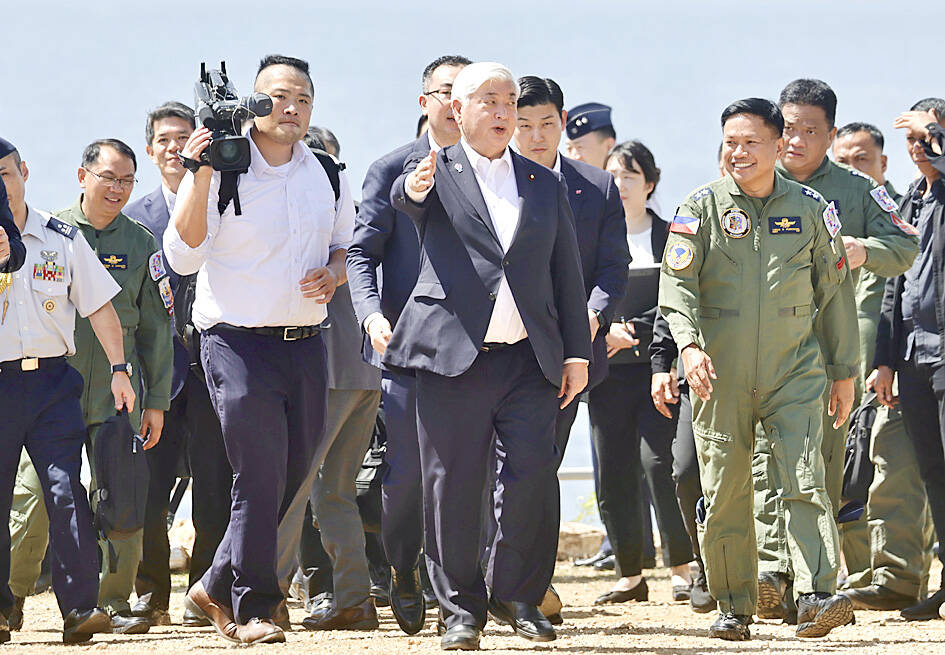France’s nuclear-powered aircraft carrier and accompanying warships were in the Philippines yesterday after holding combat drills with Philippine forces in the disputed South China Sea in a show of firepower that would likely antagonize China.
The Charles de Gaulle on Friday docked at Subic Bay, a former US naval base northwest of Manila, for a break after more than two months of deployment in the Indo-Pacific region.
The French carrier engaged with security allies for contingency readiness and to promote regional security, including with Philippine forces, navy ships and fighter jets.

Photo: AFP
They held anti-submarine warfare drills and aerial combat training on Friday in the South China Sea, Philippine and French officials said.
Last year, the French navy deployed a frigate for the first time to participate in a joint sail with the US and the Philippines in and near the disputed waters.
It was part of the largest annual combat exercises in years by US and Philippine allied forces. The drills, known as Balikatan (Tagalog for “shoulder-to-shoulder”), involved more than 16,000 military personnel.

Photo: EPA-EFE
China strongly criticized the exercises then, saying the Philippines was “ganging up” with countries from outside Asia in an obvious reference to the US and its security partners, adding that the drills could instigate confrontation and undermine regional stability.
France’s recent and ongoing military deployments to the Philippines underscore its “commitment to regional security and the shared goal of strengthening maritime cooperation in the Indo-Pacific,” Armed Forces of the Philippines public affairs head Colonel Xerxes Trinidad said.
The Charles de Gaulle, the only nuclear-powered aircraft carrier in the world other than those of the US Navy, led a strike group that included three destroyer warships and an oil replenishment vessel in its first-ever visit to the Philippines, French officials said.
France has been shoring up its military engagements with the Philippines and other Southeast Asian nations at odds with China in the disputed waters, a key global trade and security route, although it says that those emergency-preparedness actions were not aimed at any particular country.
China has bristled at any presence of foreign forces, especially the US military and its allies, which carry out war drills or patrols in the South China Sea, which Beijing claims almost in its entirety. Its claims overlap with those of Taiwan, the Philippines, Vietnam, Malaysia and Brunei.
Meanwhile, Japanese Minister of Defense Gen Nakatani yesterday visited military installations on the main island of Luzon with Philippine Secretary of National Defense Gilberto Teodoro.
The Philippine News Agency reported that Nakatani and Teodoro discussed bolstering their nations’ strategic defense cooperation, particularly on maritime and air defense, and regional security initiatives.
The pair are to have an in-depth meeting today, and Nakatani is also to meet with Philippine President Ferdinand Marcos Jr, the agency said.
Additional reporting by staff writer

INVESTIGATION: The case is the latest instance of a DPP figure being implicated in an espionage network accused of allegedly leaking information to Chinese intelligence Democratic Progressive Party (DPP) member Ho Jen-chieh (何仁傑) was detained and held incommunicado yesterday on suspicion of spying for China during his tenure as assistant to then-minister of foreign affairs Joseph Wu (吳釗燮). The Taipei District Prosecutors’ Office said Ho was implicated during its investigation into alleged spying activities by former Presidential Office consultant Wu Shang-yu (吳尚雨). Prosecutors said there is reason to believe Ho breached the National Security Act (國家安全法) by leaking classified Ministry of Foreign Affairs information to Chinese intelligence. Following interrogation, prosecutors petitioned the Taipei District Court to detain Ho, citing concerns over potential collusion or tampering of evidence. The

NEGOTIATIONS: The US response to the countermeasures and plans Taiwan presented has been positive, including boosting procurement and investment, the president said Taiwan is included in the first group for trade negotiations with the US, President William Lai (賴清德) said yesterday, as he seeks to shield Taiwanese exporters from a 32 percent tariff. In Washington, US Trade Representative Jamieson Greer said in an interview on Fox News on Thursday that he would speak to his Taiwanese and Israeli counterparts yesterday about tariffs after holding a long discussion with the Vietnamese earlier. US President Donald Trump on Wednesday postponed punishing levies on multiple trade partners, including Taiwan, for three months after trillions of US dollars were wiped off global markets. He has maintained a 10 percent

TRADE: The premier pledged safeguards on ‘Made in Taiwan’ labeling, anti-dumping measures and stricter export controls to strengthen its position in trade talks Products labeled “made in Taiwan” must be genuinely made in Taiwan, Premier Cho Jung-tai (卓榮泰) said yesterday, vowing to enforce strict safeguards against “origin laundering” and initiate anti-dumping investigations to prevent China dumping its products in Taiwan. Cho made the remarks in a discussion session with representatives from industries in Kaohsiung. In response to the US government’s recent announcement of “reciprocal” tariffs on its trading partners, President William Lai (賴清德) and Cho last week began a series of consultations with industry leaders nationwide to gather feedback and address concerns. Taiwanese and US officials held a videoconference on Friday evening to discuss the

PERSONAL DATA: The implicated KMT members allegedly compiled their petitions by copying names from party lists without the consent of the people concerned Judicial authorities searched six locations yesterday and questioned six people, including one elderly Chinese Nationalist Party (KMT) member and five KMT Youth League associates, about alleged signature forgery and fraud relating to their recall efforts against two Democratic Progressive Party (DPP) legislators. After launching a probe into alleged signature forgery and related fraud in the KMT’s recall effort, prosecutors received a number of complaints, including about one petition that had 1,748 signatures of voters whose family members said they had already passed away, and also voters who said they did not approve the use of their name, Taipei Deputy Chief Prosecutor